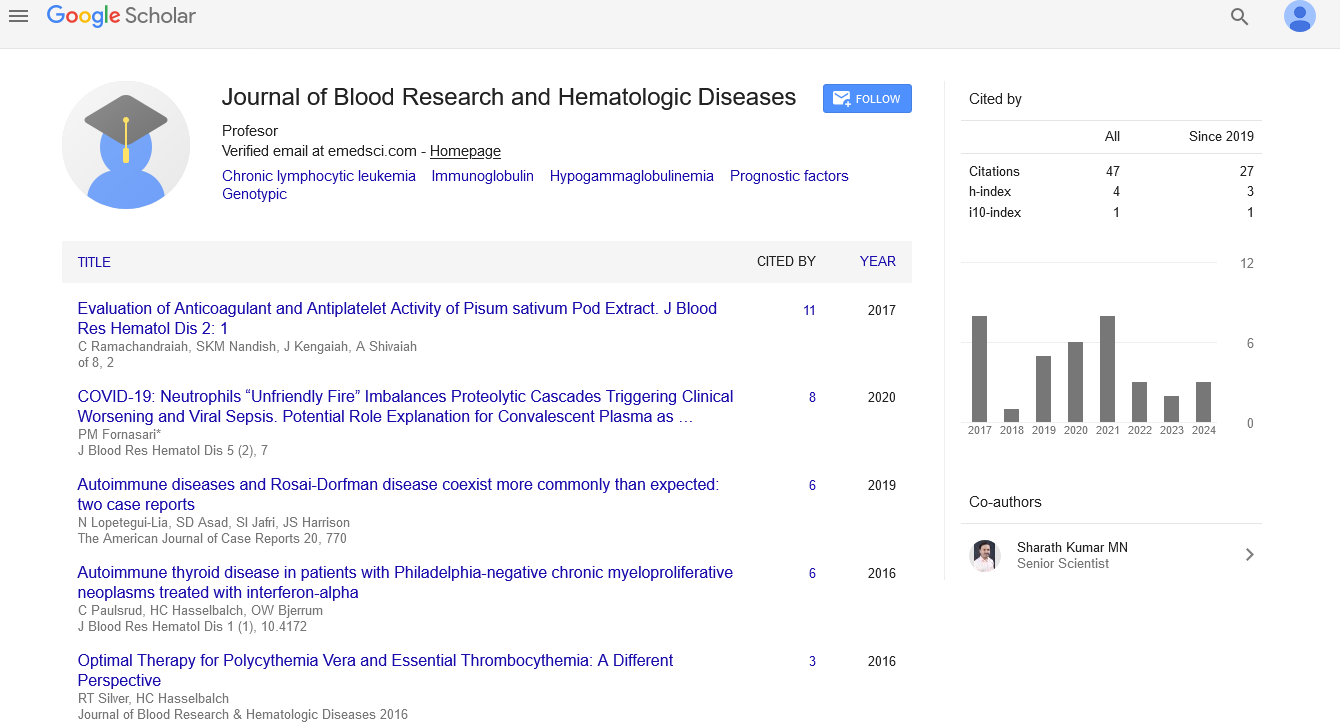Opinion Article, J Blood Res Hematol Dis Vol: 9 Issue: 1
Healing the Wounded Vessels: Cellular Responses and Regenerative Strategies
Oliviar Jackie*
1Department of Surgery, University of Pennsylvania Medical Center, Philadelphia, Pennsylvania, USA
*Corresponding Author: Oliviar Jackie,
Department of Surgery, University of
Pennsylvania Medical Center, Philadelphia, Pennsylvania, USA
E-mail: jackieoli@gmail.com
Received date: 26 February, 2024, Manuscript No. JBRHD-24-131609;
Editor assigned date: 28 February, 2024, PreQC No. JBRHD-24-131609 (PQ);
Reviewed date: 14 March, 2024, QC No. JBRHD-24-131609;
Revised date: 21 March, 2024, Manuscript No. JBRHD-24-131609 (R);
Published date: 28 March, 2024 DOI: 10.4172/jbrhd.1000196.
Citation: Jackie O (2024) Healing the Wounded Vessels: Cellular Responses and Regenerative Strategies. J Blood Res Hematol Dis 9:1.
Abstract
In the intricate network of the human body, blood vessels serve as vital conduits, ferrying oxygen, nutrients, and immune cells to tissues and organs. However, when these essential conduits become damaged due to injury or disease, the body mounts a sophisticated response aimed at repairing and restoring vascular integrity. In this article, we delve into the fascinating realm of vascular healing, exploring the intricate cellular responses and innovative regenerative strategies that contribute to the restoration of wounded vessels. At the forefront of vascular healing are an array of dynamic cellular players, each endowed with unique functions and capabilities.
Description
In the intricate network of the human body, blood vessels serve as vital conduits, ferrying oxygen, nutrients, and immune cells to tissues and organs. However, when these essential conduits become damaged due to injury or disease, the body mounts a sophisticated response aimed at repairing and restoring vascular integrity. In this article, we delve into the fascinating realm of vascular healing, exploring the intricate cellular responses and innovative regenerative strategies that contribute to the restoration of wounded vessels. At the forefront of vascular healing are an array of dynamic cellular players, each endowed with unique functions and capabilities.
Endothelial cells, which line the inner walls of blood vessels, play a pivotal role in orchestrating the repair process. Following injury, endothelial cells undergo a series of phenotypic changes, including proliferation, migration, and reorganization, to seal the breach in the vessel wall and restore its barrier function. Adjacent to the endothelial layer lies the Vascular Smooth Muscle Cells (VSMCs), which provide structural support and regulate vascular tone. In response to injury, VSMCs undergo a process known as phenotypic switching, transitioning from a quiescent contractile state to a synthetic, proliferative state. This phenotypic switch enables VSMCs to participate in the formation of a protective neointima-a layer of cells that covers the injured area and promotes vessel healing.
Central to the process of vascular healing are inflammatory mediators and signaling pathways that govern the recruitment and activation of immune cells. Upon injury, resident immune cells such as macrophages and neutrophils are rapidly mobilized to the site of damage, where they release a plethora of cytokines, growth factors, and proteases. These inflammatory mediators serve as potent signaling molecules, orchestrating various cellular responses involved in vascular repair. For instance, Transforming Growth Factor-Beta (TGF- β) promotes the proliferation and migration of endothelial and smooth muscle cells, while Vascular Endothelial Growth Factor (VEGF) stimulates angiogenesis-the formation of new blood vessels-to restore perfusion to ischemic tissues.
Regenerative strategies and therapeutic interventions
In recent years, advances in regenerative medicine have paved the way for innovative strategies aimed at enhancing vascular healing and promoting tissue regeneration. One such approach involves the use of biomaterials and tissue engineering techniques to create scaffolds that mimic the native extracellular matrix of blood vessels. These biomimetic scaffolds provide a supportive environment for the adhesion, proliferation, and differentiation of endothelial and smooth muscle cells, facilitating the formation of functional neo-vessels. Moreover, bioactive molecules such as growth factors and cytokines can be incorporated into these scaffolds to further enhance their regenerative capacity. In addition to biomaterial-based approaches, emerging technologies such as cell-based therapies and gene editing hold promise for enhancing vascular healing. For example, Mesenchymal Stem Cells (MSCs) have been shown to exert potent immunomodulatory and pro-regenerative effects, making them attractive candidates for promoting vascular repair in a variety of pathological conditions.
Conclusion
Healing the wounded vessels is a complex and dynamic process orchestrated by a myriad of cellular responses and signaling pathways. By elucidating the mechanisms underlying vascular repair and exploring innovative regenerative strategies, researchers are paving the way for new therapeutic interventions aimed at restoring vascular integrity and improving patient outcomes. As our understanding of vascular healing continues to evolve, so too does the potential to harness the body's innate regenerative capacity to heal and regenerate damaged blood vessels. Advancements in regenerative medicine offer promising avenues for enhancing vascular healing through biomaterial-based scaffolds and cell-based therapies like Mesenchymal Stem Cells (MSCs), heralding a new era in tissue regeneration and vascular health.
 Spanish
Spanish  Chinese
Chinese  Russian
Russian  German
German  French
French  Japanese
Japanese  Portuguese
Portuguese  Hindi
Hindi 